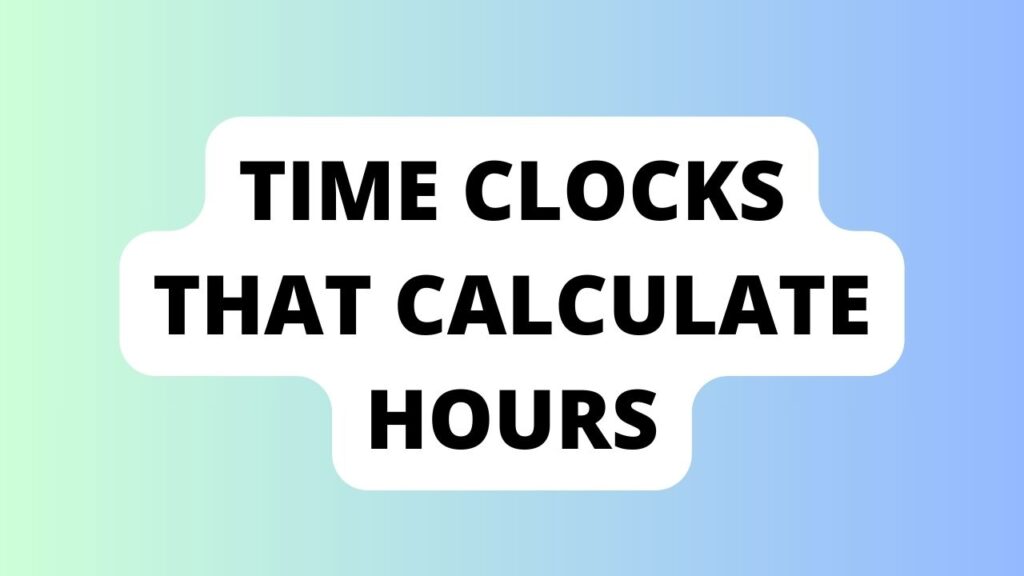Introduction
Time clocks have significantly evolved, transforming how businesses manage employee hours and streamline payroll processes. In today’s dynamic work landscape, the utilization of time clocks that calculate hours has become instrumental across various industries.
Definition of Time Clocks
These devices are mechanisms used by businesses to track the hours worked by employees accurately. They have moved far beyond the traditional punch cards, incorporating sophisticated technologies for enhanced efficiency.
Importance in Various Industries
From small enterprises to multinational corporations, time clocks are pivotal. They provide a systematic approach to monitor work hours, ensuring fair compensation and aiding in productivity analysis.
History of Time Clocks
Early Forms of Timekeeping
The history of time clocks dates back centuries, with early timekeeping relying on rudimentary methods like sundials and hourglasses. However, the Industrial Revolution propelled advancements in timekeeping mechanisms.
Evolution of Time Clock Technology
The 19th century witnessed the emergence of punch card time clocks, simplifying employee attendance tracking. Today, we see cutting-edge biometric and web-based time clock software revolutionizing workforce management.
Types of Time Clocks
Traditional Punch Card Clocks
These classic devices required employees to physically insert a card into the machine to record their work hours. However, they lacked accuracy and were prone to manipulation.
Biometric Time Clocks
Utilizing fingerprint or facial recognition, biometric time clocks have significantly enhanced accuracy, preventing fraudulent practices and ensuring reliable attendance records.
Web-based Time Clock Software
With the advent of the internet, cloud-based time clock solutions have gained traction. These allow employees to clock in and out from remote locations, catering to the modern, flexible work environment.

Benefits of Time Clocks
Accuracy in Tracking Work Hours
The precise tracking provided by these clocks minimizes errors, ensuring fair compensation for employees and aiding employers in maintaining accurate records.
Payroll Management Efficiency
Automated time clock systems simplify payroll processing, reducing administrative burden and ensuring timely and accurate payments.
Employee Accountability
Time clocks foster a sense of accountability among employees, encouraging punctuality and discipline, ultimately boosting productivity.
Apologies for the confusion earlier. Let’s proceed with the article:
Implementing Time Clocks
Steps to Set up Time Clock Systems
Implementing a time clock system involves several steps, including selecting the appropriate technology, installing the hardware or software, and integrating it with existing business processes.
Best Practices for Integration
Smooth integration requires training employees on using the system, establishing clear policies, and regularly maintaining and updating the time clock technology.
Time Clocks in Businesses
Small Business Applications
For small businesses, time clocks offer a cost-effective solution for managing employee hours, aiding in accurate billing, and facilitating compliance with labor laws.
Large Enterprise Solutions
In larger enterprises, sophisticated time clock systems streamline complex workforce management, catering to a diverse employee base across multiple locations.
Addressing Common Issues
Security Concerns and Solutions
Cybersecurity threats pose challenges to time clock systems. Employers must invest in robust security measures to safeguard sensitive employee data.
Troubleshooting Time Clock Errors
Technical glitches are inevitable. Having a dedicated support system to address and resolve these issues promptly is essential for seamless operations.
Future of Time Clocks
Advancements in Timekeeping Technology
The future holds exciting possibilities with advancements like AI-driven time clock systems that predict workforce trends and adapt to changing work environments.
Predictions for Future Innovations
We anticipate further integration with wearable tech, allowing for seamless tracking of work hours through smart devices, enhancing convenience and accuracy.
FAQs
- How do time clocks calculate hours? Time clocks use various methods such as biometric recognition, RFID, or manual inputs to track employee start and end times, calculating total work hours.
- Can time clocks prevent time theft? Yes, biometric time clocks, by their very nature, significantly reduce instances of time theft or buddy punching due to their authentication methods.
- Are biometric time clocks accurate? Biometric time clocks boast high accuracy rates, ensuring reliable attendance tracking by validating unique biometric features.
Conclusion
Time clocks that calculate hours stand as pillars of efficiency, enhancing productivity, ensuring fairness, and simplifying administrative tasks. Embracing these technological advancements is pivotal for businesses aiming to thrive in the modern work landscape.
